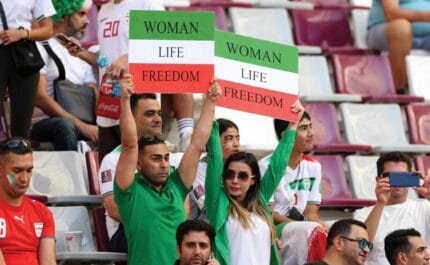The fall of Beirut
Within 20 minutes of the explosion that devastated central Beirut, Daisy Mohr had arrived at the area affected by the blast. She bears witness to the fallout, the grim resilience of the survivors and the years of corruption that left the city so brutally exposed
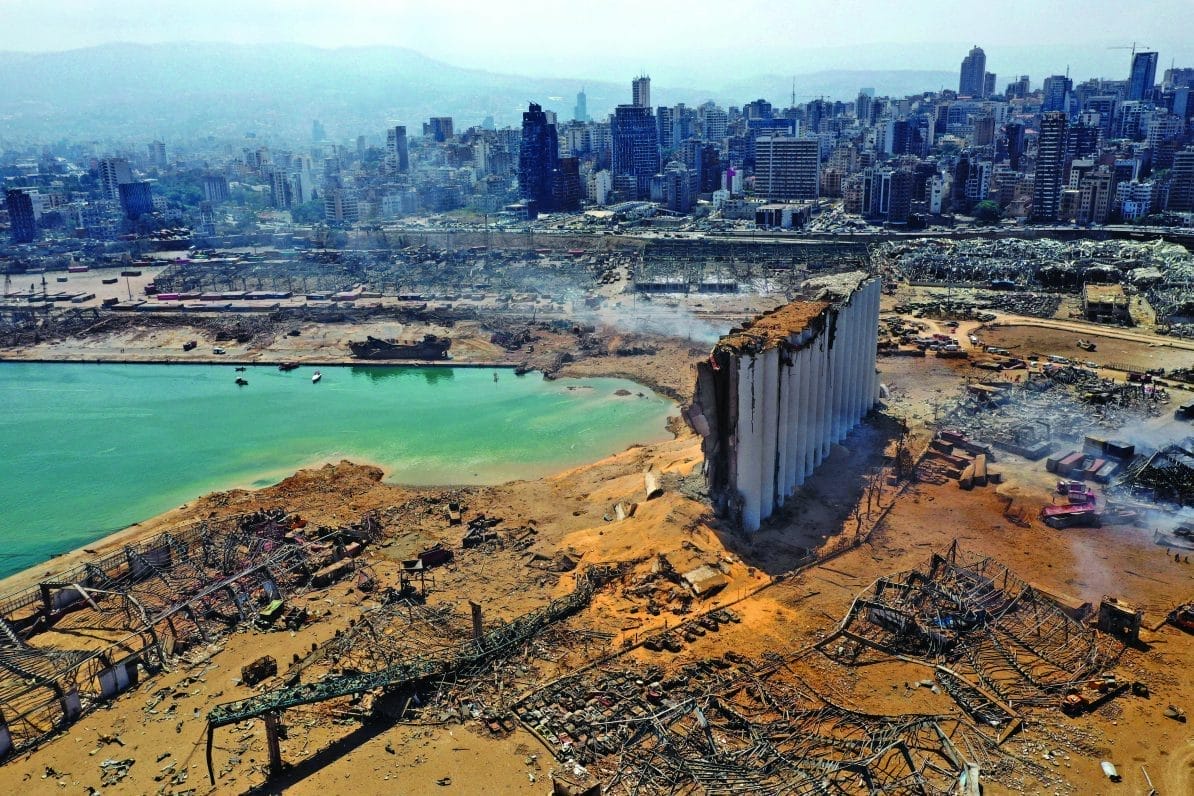
An aerial view shows the damage done to the port of Beirut by the blast of 4th August 2020. FP via Getty Images
4th Aug 2020 (Taken from: #40)
Tuesday 4th August was a beautiful, sunny day in the Lebanese capital of Beirut. It was warm and there was a clear blue sky, but the streets were quiet, with none of the levity residents have long associated with this normally carefree and chaotic city. Lebanon’s recent economic crash, a fresh bout of political dysfunction and the Covid-19 pandemic had all combined to create an atmosphere of anxiety. Many felt that Lebanon had hit rock bottom. What else could possibly go wrong?
“I came to work early that evening, ordered a coffee at Bartartine next door and had a chat with the waiter. He knows exactly how I like my coffee because he brings it to me every day,” says Tommy Tabib. Tabib is the owner of L’osteria, a bar in the middle of Mar Mikhael, a street next to the port of Beirut that’s lined with hundreds of little pubs, restaurants and cafés. “We had a chat about how he was hoping to leave the country, how he was planning to study abroad – such a bright guy.”
Tabib finished his coffee and started preparations to open his bar. He suspected it wasn’t going to be a good night, but with luck enough people might come to at least fill the terrace. It had been a tough few months and another Covid lockdown was always just around the corner. The country’s currency, the Lebanese pound, had collapsed and banks had frozen saving accounts, making it impossible for Tabib to pay his staff for a time. “We were having the worst 11 months of our lives,” he says.
Tabib had just taken a seat inside L’osteria when he heard an explosion. He did not know it, but this relatively small blast would be followed 35 seconds later by a truly devastating second one. “We all ran outside to see what was going on,” he remembers. “We thought we heard planes. I screamed: ‘Guys, there is another plane coming!’” Half of his employees went back inside to take cover. Tabib and his friend stayed on the terrace to try to understand what was going on. “And then I saw this bright light. I saw windows falling away in slow motion, and then this big wind sucked me inside. Three, four metres in to the bar.”
He landed on top of rubble, blinded by thick dust. “I remember wondering if I was alive,” he says. “So many people around us died. Next to me, they died. Above me, they died. I saw people jumping out of buildings across the road. I honestly don’t know how I am not badly injured or dead. The lovely guy that brought me my coffee, may he rest in peace, he didn’t make it.”
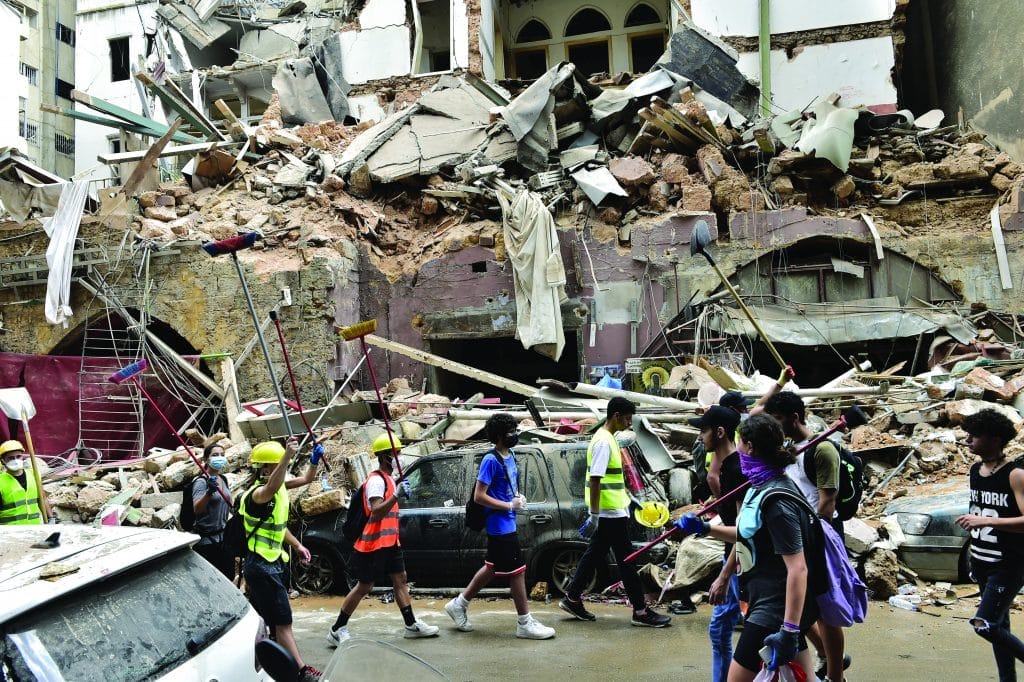
Volunteers brandishing brooms set out to help clear up debris after the explosion at the port. Photo: Houssam Shbaro/Anadolu Agency via Getty Images
The 2,750 tonnes of ammonium nitrate that blew up at 6.07pm on 4th August in the port of Beirut killed over 200 people and wounded 6,500 more. It destroyed 80,000 homes, left 300,000 people homeless and caused billions of dollars in damage. It was so loud it was heard in Cyprus, 150 miles away. Jordanian seismologists measured the blast as equivalent to a 4.5-magnitude earthquake on the Richter scale.
Once Tabib had gathered his wits about him, he set out to get medical assistance for his staff. “I somehow found my car keys but then I noticed my car was completely smashed,” he says. He shows me videos on his phone of the aftermath. His car is covered in masonry, its windows caved in. The street and his café are destroyed, with piles of rubble and glass everywhere. “There were no ambulances. The only way to get my guys to a hospital was in my smashed car. I managed to open the door and get them in. I don’t know how we drove there. I sat sideways. There was blood everywhere.”
As four local hospitals had been destroyed by the blast and the rest in the city were overrun by maimed and injured people, Tabib drove his injured staff 40 kilometres to Byblos. Between them they received hundreds of stitches for lacerations from flying glass. Meanwhile Beirut’s hospitals, those that survived, resembled war zones. The injured were laid out in corridors waiting for help, others were turned away and sat on the pavements outside not knowing where else to go. Many doctors and nurses were killed or injured, reducing capacity even further. And in the background lurked the ever-present menace of Covid-19.
The huge initial blast wave of the explosion made many think it was an earthquake. The negative pressure that followed ripped windows and doors from their hinges. It was so powerful it blasted furniture out into the street and threw people and cars into the air. It turned glass and wood into deadly flying shrapnel, meaning that a centimetre one way or the other could make the difference between life and death. Hedwig Waltmans-Molier, the wife of the Dutch ambassador to Lebanon, died from injuries sustained in her apartment. Her husband, who was standing next to her, barely had a scratch. Everywhere in the city people felt as if this explosion had taken place inside their house.
When you ask people about the days that followed, they tell you that they don’t remember much, as if they were going about their lives like zombies. Yet a survival instinct kicked in, as did a powerful solidarity among ordinary Beirutis.
“Our lives were turned upside down in a split second,” says Mariana Wehbe, the owner of a PR company. “We lost our homes, our offices. I have a friend who passed away, leaving three children. I have two friends who were left without hands.” When the explosion hit, Wehbe had just stood up to call her daughter. “Had I been sitting on my chair, I would have been killed by the glass walls surrounding me,” she says. “I don’t know how I am alive.”
During those early days Wehbe remembers the constant sound of people treading on crunching glass. It was everywhere. Soon she decided that she couldn’t sit back and do nothing. She got a group of friends together and formulated a plan. “We started doing the basics, fixing doors and windows,” she says. Her living room turned into the nerve centre of what became ‘Beb w’ Shebbek’, Arabic for ‘doors and windows’. Prominent architects and interior designers joined and within days there was a 200-strong team on the ground, working around the clock. “I have no idea how all these volunteers came together,” says Wehbe. “There are still amazing people here.” She knew Beirutis wouldn’t be able to start fixing their houses by themselves. Given the economic circumstances people desperately needed help. “Family after family had lost everything,” she says.

Damaged buildings in the Gemmayze neighbourhood of Beirut. Photo: AFP via Getty Images
In the days after the blast, no government agencies arrived to help clean up or start rebuilding Beirut. The absence of the authorities was distressing but not surprising to most Lebanese people, who are used to a dysfunctional and corrupt system of government.
The Lebanese civil war ended with the 1989 Taif agreement which codified and rebalanced a long-standing power-sharing mechanism aimed at guaranteeing political representation for all of Lebanon’s 18 officially recognised religious groups. The president must always be a Maronite Christian, the speaker of parliament a Shia Muslim and the prime minister a Sunni Muslim. Government posts and public-sector positions are also divided along sectarian lines.
Political sectarianism created leaders who maintained their power through patronage networks, protecting the interests of their communities. The same political elite, often passing power down to their children, has remained in charge throughout. Without strong central government control, private contractors connected to the political establishment filled the gaps, making big profits by providing – or failing to provide – basic services like electricity and water.
After the civil war, neighbouring Syria effectively occupied Lebanon. The Taif agreement stated that Syrian forces should leave within two years but that didn’t happen. Change didn’t come until former prime minister Rafic Hariri was assassinated in Beirut in 2005. Many Lebanese believed that Syria was behind the car bomb that killed him and this led to massive protests on the streets of Beirut – the Cedar Revolution – and eventually to the withdrawal of Syria’s army.
The only party that didn’t hand in its weapons after the civil war was the Iran-backed Shiite militant group Hezbollah. Listed by many countries as a terrorist organisation, it also developed its social and political wings and is now seen as a state within a state. No political change is possible without the approval of this Iranian and Syrian proxy in Lebanon. In August 2020 a UN tribunal found a mid-ranked member of Hezbollah guilty of Rafic Hariri’s assassination.
Whilst many Lebanese had hoped that the Beirut port explosion would lead to change, instead it exposed the political vacuum at the heart of the system. So people took matters into their own hands. Hundreds of volunteers came into the streets bringing their shovels, rakes, gloves and rubbish bags. It seemed like an impossible challenge to clean everything up. Students started clearing through piles of rubble, even though the balconies above them looked like they were about to fall on their heads. Families cooked meals to feed people in the affected areas. Animal rescue teams ran around the streets with cans of tuna, recovering hundreds of lost pets and reuniting them with their injured owners.
“I didn’t come back [to the bar] for 48 hours. I kept on crying in my room, wondering how I survived,” says Tabib. But when he did return the damage was overwhelming. “I said: ‘Where shall I start, how shall I start? I don’t know how to do this.’ It was complete chaos, people were still missing, dead under the rubble.” But young Lebanese volunteers had travelled from across the country to help to clean up the city. One group visited Tabib’s bar and in ten hours the place was clean. “You could walk in bare feet,” he says. “It put tears in my eyes; the solidarity of people can be so strong. They even gave us food and water.” Eyewitnesses kept reporting the same thing: that throughout the clean-up, the army and police stood on the sidelines and observed it all, doing nothing.
The visit of French president Emmanuel Macron, two days after the blast, was another painful illustration of the government’s absence. Macron was received like a pop star as he walked down the now-devastated Gemmayze Street, hugging and comforting people. At that point no Lebanese politician had found the time to visit the site or any of the hospitals. There was already anger at Lebanon’s dysfunctional political class, but the blast seemed to have radicalised people even further. “How we are not on the streets killing each and every one of them, I do not understand,” says Wehbe.
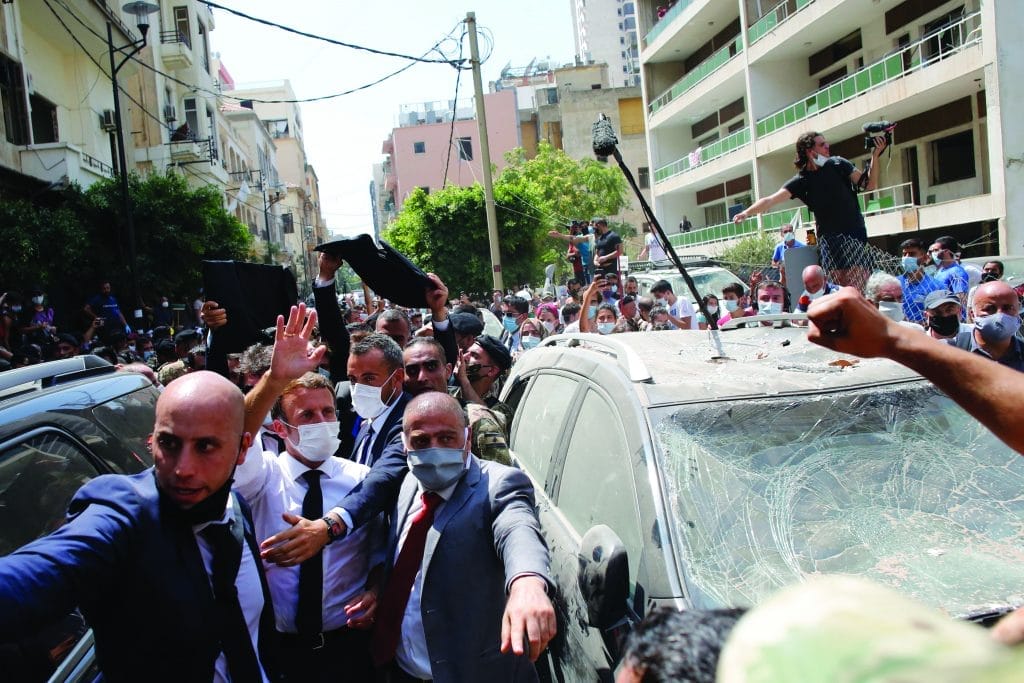
French president Emmanuel Macron waves at residents as he visits a devastated street in Beirut on 6th August 2020. Photo: Thibault Camus/Pool/AFP via Getty Images
On Saturday 8th August, tens of thousands of protesters gathered in downtown Beirut to express their outrage over government incompetence. They were met by police firing tear gas. Human Rights Watch later issued a report saying that Lebanese security forces used excessive and lethal force against mostly peaceful protesters. “They fired live ammunition, metal pellets and rubber balls, including at health workers,” the report states alongside a long list of other infractions. “Instead of lending a helping hand to fellow Beirutis still digging themselves out of the explosion debris, Lebanon’s security apparatus made a fist and pummelled protesters with shocking amounts of violence,” said Michael Page, deputy Middle East director at Human Rights Watch. “Such unlawful and excessive force against mostly peaceful protesters shows the callous disregard of the authorities for their own people.” Over 720 people were injured that afternoon, too many to be treated in Beirut’s already-stretched hospitals.
Downtown Beirut had become accustomed to protests in recent months. Since 17th October 2019 huge demonstrations sparked by the collapsing economy and unhappiness with the political elite had swept the country. Protesters came from different economic, social and religious backgrounds. They chanted for the entire political class to be swept away: Killon yani killon, Arabic for ‘All of them means all of them’. Prime Minister Saad Hariri, Rafic Hariri’s son, resigned on 29th October 2019. “We have reached a deadlock and we need a shock in order to brave through the crisis,” Hariri said on national television. “This is in response to the will… of the thousands of Lebanese demanding change.” It was a good first step for the protesters but they wanted much more: a complete overhaul of the corrupt, sectarian system that has ruled them for so long.
It took until late January 2020 to find a new prime minister, Hassan Diab, and longer for him to form a government. Meanwhile hyperinflation and the economic crash meant that more and more people were losing their jobs. Those lucky enough to still be employed were often paid half their salary. Savings became virtually worthless and limits were placed on bank withdrawals.
Lebanon’s economic problems had been building for a long time, the result of years of corruption, financial mismanagement and a dubious banking system. The Lebanese pound, also known as the lira, had been pegged at 1,500 to the dollar since the end of the civil war. Now it trades on the black market for as much as 9,000 to the dollar. The country defaulted on a foreign debt payment for the first time ever in March and year-on-year inflation hit 120 percent in August. The country’s GDP is projected to shrink by 25 percent in 2020.
Lebanese banking secrecy was once so renowned that the country was often referred to as the ‘Switzerland of the Middle East’. Now, the joke went, it was rapidly becoming the Venezuela of the Middle East. By the spring, people were being advised by the Ministry of Agriculture to plant crops on any land they owned and food insecurity became an increasing worry given that Lebanon imports around 85 percent of its food. People started hoarding and supermarkets restricted the number of items they could buy, with goods increasing in price throughout the day. Most could no longer afford to eat meat. According to a UN report, by April almost half of Lebanon’s population was living below the poverty line.
The spring also brought another shock to the system: the coronavirus. A series of strict lockdowns initially kept infection levels low but what was left of the economy was devastated. By June, many Lebanese had started exchanging possessions online. A car seat for baby milk and pasta? Shoes for nappies? Even a wedding dress was exchanged for food on a popular new Facebook group called ‘Lebanon Barters’, which gained 16,000 members within the first month alone. “Instead of having people beg for food, I wanted to find a respectful way to let people deal with the situation,” says Hassan Hasna, founder of the group. “People exchange clothes, glasses and cutlery not because they don’t want it any more, but because they really need the food. People losing jobs, the heavy bank restrictions and ever-increasing prices mean they simply cannot afford the basics any more.”
Long lines at the bank became a daily event. You would see desperate people crying, begging, fighting or screaming at bank workers in an attempt to access their money, but it made no difference. Transferring money abroad became impossible, a real challenge for a nation with a major international diaspora. Bank branches were attacked and bombed and many now need police protection. Coronavirus became a footnote to much bigger problems in Lebanon.
“At the beginning of the pandemic we were so scared but since the explosion we totally forgot about coronavirus,” says Nohad el Mir amidst the rubble of what is left of her home in the Karantina neighbourhood of Beirut. Two kitchen walls have been blown away. All that is left is an open area, without a roof, facing directly on to the main street. El Mir’s stove, fridge and washing machine, as well as all her furniture, have been damaged beyond repair. “We really have other priorities now,” she says. “Corona is behind us; it is more important to fix things and return to our houses.” Karantina, a working-class district overlooking the port, was flattened on 4th August. El Mir, a secretary for a company at the port, was on her way home when the explosion took place. Her office disappeared in the blast. “I don’t think I have a job any more,” she says. “I have no other wishes than to get my home fixed. My family has lived here for generations.”
With prices increasing daily, she has no idea how she will get back what she has lost. She expects no reimbursement from her insurance company and no help from the authorities. Without an income and with her meagre savings stuck in the bank, rebuilding will be all but impossible. “I believe there is no future in Lebanon, especially for young people,” she says while making coffee on a camping gas stove she has placed on the one remaining kitchen surface. She serves it in little cups she received as a donation. “Lebanon keeps going backwards. It is sad to see. This will become a place for the elderly. Eventually they will be the only ones that stay.”
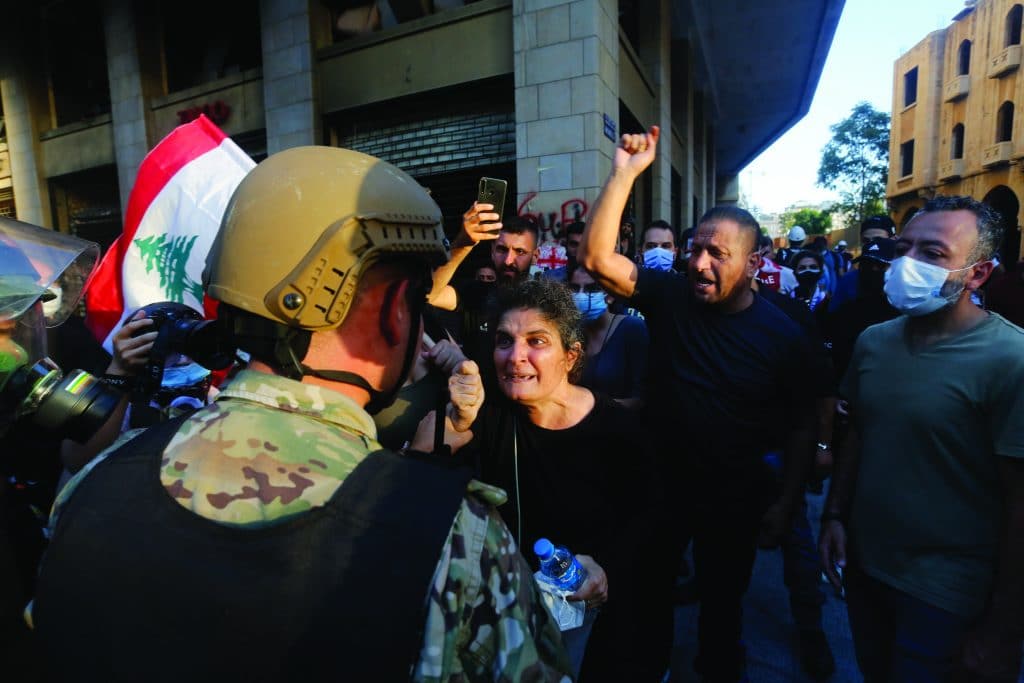
Protesters shout at a member of the army during anti-government demonstrations on 8th August 2020. Photo: Marwan Tahtah/Getty Images
The port of Beirut is symbolic of everything many Lebanese feel is wrong with their dysfunctional political system. “The port is basically like all government institutions. It was very lucrative in terms of bringing in funds to established political parties,” says Mohanad Hage Ali, director of communications at the Carnegie Middle East Center in Beirut. “The system between the various sectarian powers allows this. There are certain tricks that are used to make money out of increasing tariffs and depriving the government of those funds and funnelling cash to the established political parties.”
But how did 2,750 tonnes of ammonium nitrate end up there in the first place? And how did it end up staying there for over six years? In November 2013 a Moldovan-flagged ship, the MV Rhosus, sailed into Beirut loaded with the chemical compound. The cargo was reportedly destined for an explosives manufacturer in Mozambique but the ship experienced technical problems and was directed to the port. The Rhosus was inspected by port officials and declared unseaworthy. As various government departments argued about what to do with the cargo, the Ukrainian crew were trapped onboard for months. Eventually they were allowed to disembark and return home. The port authorities transferred the highly explosive material to Warehouse 12, next to the port’s grain silos. In the years that followed various authorities, including customs officials, warned that the ammonium nitrate needed to be removed from the port. But the petitions were sent to the wrong court several times. Nothing happened.
On 4th August, the government finally did something. A team of welders was sent to fix a broken door at the warehouse. It remains unclear whether their work accidentally lit the fire that caused the explosion, but it was later revealed that Warehouse 12 was a bomb waiting to go off. Alongside the ammonium nitrate were jugs of acid and kerosene, spools of fuse and 15 tonnes of fireworks. Government prosecutors launched an investigation. It soon became clear that various government departments, as well as the security agencies, were aware of the ammonium nitrate stored in the port, but not one of the top political and security officials that knew of its presence has yet been arrested as part of the investigation. So far only low and mid-level administrative and security officials have been charged. Without a proper international investigation many Lebanese doubt they will ever get to the truth: as it stands, those who allowed the explosion to happen will essentially be the people investigating it.
Devastated family members of those who died are desperate for answers. Victims of the blast have been calling for an international fact-finding mechanism. So far these calls have been rejected. “Lebanon has a long and wretched history of its politicians allowing serious crimes – including serious human rights violations – to go unpunished, and that’s precisely what appears to be happening all over again,” said Kate Allen, director of Amnesty International UK, in a recent report.
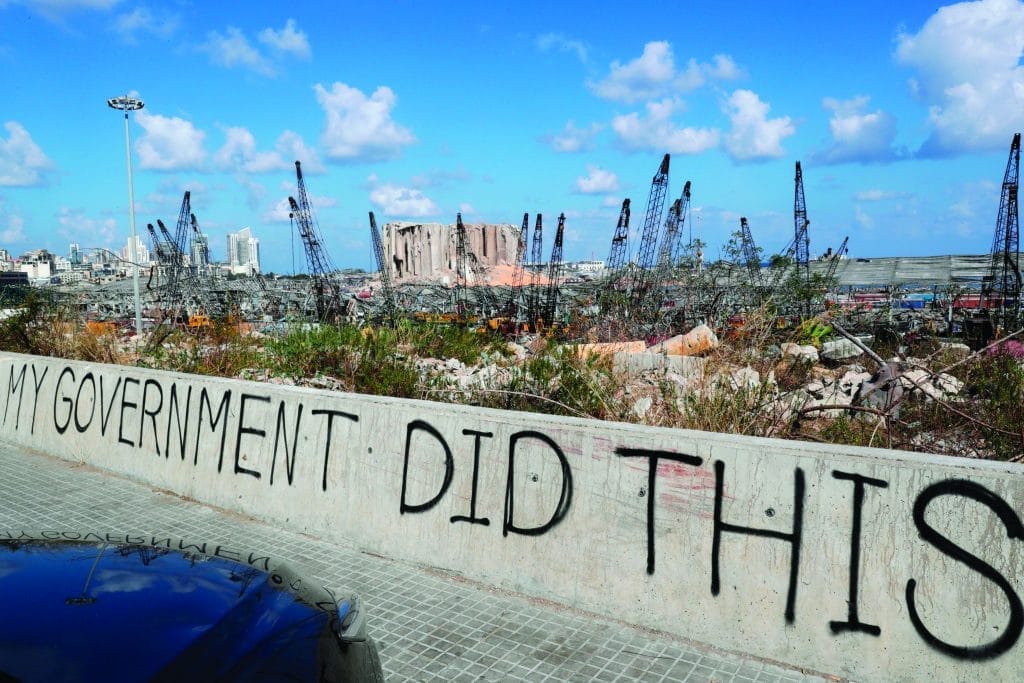
Graffiti on a wall overlooking the port of Beirut, 9th August 2020. Photo: Anwar Amro/AFP via Getty Images
Three months after the explosion, reconstruction is going painfully slowly. The international community will only release funds when government reforms have been carried out. So far, there is no sign of that. So Mariana Wehbe is still running around town fixing doors and windows. She has worked on nearly 400 homes. Hundreds more are in the pipeline and the donations keep coming in. Her mission has given new meaning to her life. “I never thought I would smile again, laugh again. But it is coming,” she tells me on the roof of her new office in the middle of the devastated area.
The volunteers recently moved out of her house after they discovered that one visitor had given at least six members of the team Covid-19, underlining just how real the dangers from the pandemic are. After the explosion, social distancing and mask-wearing measures were overshadowed by the bigger concerns of day-to-day survival. Lebanon’s overall number of cases stood at 5,000 on the day of the explosion but had shot up to over 100,000 by mid-November. The health system, which was already on the verge of collapse, has had a hard time coping. ICU beds are in short supply, and medications are difficult to import.
Wehbe had the luxury of being able to send her 15-year-old daughter to live with an aunt in the Gulf. “I don’t think I could do this with her around. It is just all too intense,” she says. The experience has taken a psychological toll. “I am like a schizophrenic. In the morning I come to Beb w’ Shebbek and into the devastated areas, then I go home, I get changed into my beautiful clothes and I go to see my luxury clients. It is hard for that world to mean something to me now.”
Her most acute worry this afternoon is the first big storm that is about to hit the city since the explosion. When it rains in Lebanon, it really pours. The poor drainage, a product of decades of infrastructure neglect, means that the streets frequently flood. “I just wish we had some more time because it will affect so many people. I have no idea how we will cope. We don’t know if we are going to be flooded. Maybe our buildings have shifted. How about the piping?” she says. As she speaks, police officers are driving around the area warning about the upcoming storm through a megaphone. “What are people supposed to do?” says Wehbe with a shrug. “They don’t even have the money to feed themselves.”
Just down the road, Tommy Tabib was one of the first on his street to reopen his bar, L’osteria, a week after the explosion. “We needed to open as fast as possible. Purely to boost morale and to make sure my people would keep their jobs,” he tells me on the bar’s terrace. “How else would we survive?” Much of the street is in darkness. The government has long failed to provide sufficient electricity and many of the individual generators, which every building has, and which people have to pay a fortune for every month on top of their power bill, were destroyed by the blast.
Some of L’osteria’s regulars have life-altering injuries, others are still in hospital. A few remain in comas. Nearly everyone who continues to come to the bar has been affected by the blast. “The mood is not the same. I saw many things in my life but this one affected me a lot psychologically,” says Tabib. “At the beginning, I spent days and nights crying and thinking. I couldn’t sleep for two weeks. I was having flashbacks, seeing badly injured people. The trauma is huge. Everyone still jumps at loud sounds.”
If you are Lebanese and older than 40, you are likely to have lived through extraordinary upheaval, including 15 years of civil war, Israeli invasions and bombing campaigns, 30 years of Syrian occupation, economic collapse, car bombs, and a host of political assassinations. More recently there was also the huge influx of refugees caused by the civil war in Syria. Today there are 1.5 million Syrian refugees in Lebanon, making up around 20 percent of the population. For many, the port explosion was too much to bear, and NGOs and psychologists have warned of a mental health emergency.
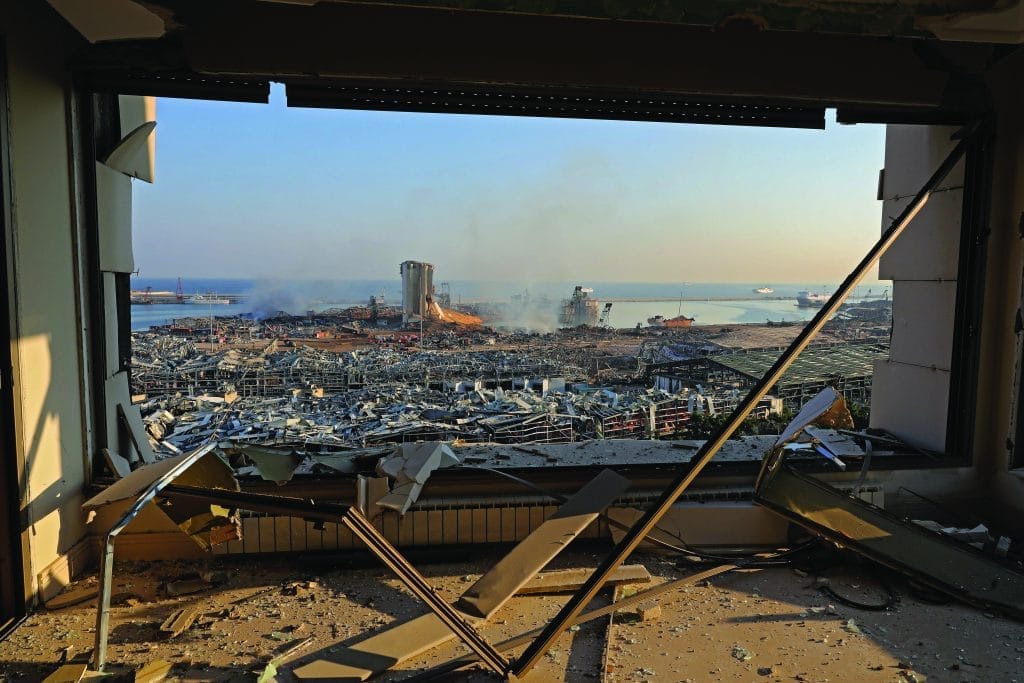
A view of the port of Beirut the day after the explosion. Photo: Anwar Amro/AFP via Getty Images
“Most of the families and children I saw came from areas within ten kilometres of the explosion centre,” says Pauline Nadjarian, a psychologist in Beirut. She offered her services to families for free and heard stories that reminded her of her own childhood experiences during the civil war. “People needed to vent about what they had been through,” she says. “Many had flashbacks from their early years and experiences with explosions and bombs and shelling.”
It is perhaps not surprising that a large number of Beirutis have simply decided to move abroad. “Many I know left as soon as they could,” says Tabib. “They packed up and jumped on the first plane.” He shows me some messages from friends making their emotional goodbyes. A new exodus is underway with long lines of talented, well-educated, trilingual Lebanese leaving in search of a more stable life. “The explosion was the final straw. It was too much to bear,” says Tabib. “And they are right: we don’t need to be living like this.” Leaving the country legally is only possible with a passport or a visa and some who don’t have the necessary documentation have been driven to attempting to leave illegally by sea. There has been an increase in the number of small boats departing for Cyprus and Lebanese families have begun to arrive in refugee camps in Greece after making the dangerous crossing of the east Mediterranean.
For now, both Tommy Tabib and Mariana Wehbe have decided to stay and keep fighting for a better future. “They will never shut the spirit of this country; they will never shut us down. We survived many things, we won’t give up so easily,” says Tabib. Yet shortly after we speak in November, another Covid-19 lockdown is announced which means financial disaster for his business. He may have to close for weeks. There is no government help, no stimulus cheques, no furlough scheme. The government is bankrupt. “Everything is screwed, but I am staying for now,” says Wehbe. “What do you want me to do, leave this country to the warlords?”
Prime minister Hassan Diab resigned in the aftermath of the explosion. His replacement is former prime minister Saad Hariri, who was sworn in exactly a year after he was driven out by protests. The political carousel keeps turning.
Slow Journalism in your inbox, plus infographics, offers and more: sign up for the free DG newsletter. Sign me up
Thanks for signing up.

